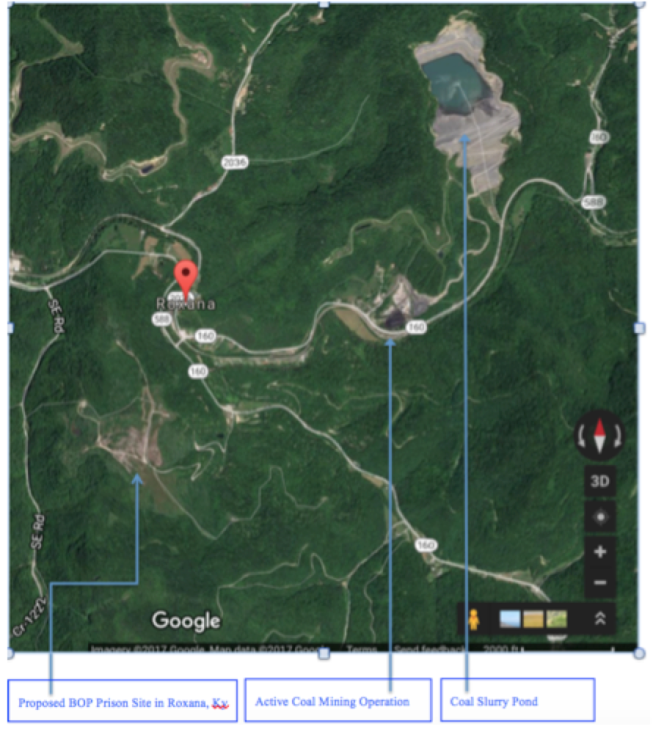Media Release: Prisoners File Lawsuit Against New Federal Facility on Toxic Strip Mine Site in Kentucky
November 27, 2018
For Immediate Release 11/27/18

Contacts:
Emily Posner, Attorney for Campaign to Fight Toxic Prisons, (207) 930-5232
Prisoners File Lawsuit Against New Federal Facility on Toxic Strip Mine Site in Kentucky
PICTURES AVAILABLE
Washington, DC — Lawyers with the Campaign to Fight Toxic Prisons and the Abolitionist Law Center (ALC) and have filed a federal environmental lawsuit against the Bureau of Prisons (BOP) representing prisoners from across the country who say they were not properly informed about $444 million dollar plans to construct a new federal prison on top of a former coal mine, next to an active mine and coal sludge pond, which could house them in the near future.
Twenty-one prisoners are listed as plaintiffs, along with the ALC. The complete court filing can be found here. Pictures from the lawsuit and the prison site here.
The lawsuit comes after more than three years of a controversial Environmental Impact Statement (EIS) process conducted by the BOP and the consulting firm, Cardno. Public comments submitted by attorney Emily Posner in 2017 on behalf of the ALC can be found here.
The lawsuit states that federal prisoners should have been considered as parties with legally-required access to EIS documents, as required by the National Environmental Policy Act (NEPA). The EIS process outlines a wide range of social and environmental impacts, including potential health risks and alternatives to construction, which prisoners are uniquely situated to provide insight on and particularly vulnerable to the results stemming from the final EIS approval which occurred earlier this year.
The prisoners are asking the courts to halt progress on the plan until they have received access to documents for review and comment.

One prisoner listed on the lawsuit, Manuel Gauna, stated: “I believe that construction of this particular prison is neglecting the people in Letcher and the people in the prison system. We as prisoners should have had the opportunity to participate in this public comment period for this project. Correctional officers are overworked at my facility [FCI Mendota]. I wish that the BOP would spend the money that it wants to use to build a new prison to properly staff this prison.”
Another prisoner named in the suit, Mark Jordan, currently at USP Tucson, explained, “Just last week President Trump publicly announced his support for the FIRST STEP Act, a reform bill aimed at reducing the federal prison population. The Letcher County project flies directly in the face of this reform narrative.”
Jordan continues, “Despite serious environmental and health hazards, the Justice Department solicited public comment from everyone except those most directly impacted by the project, the prisoners themselves. Health and safety issues aside, this is but a needless pork barrel project ushered through by Kentucky Representative Hal Rogers at a time when public opinion and policy-makers are trying to reduce the population of the federal prison system, not build more prisons merely for the sake of building more prisons.”
Prisoners aren’t the only ones concerned about the facility. Letcher County resident Elvenia Blair, who lives close the proposed prison, is also opposed to the plan.
Blair, who has been contesting the prison for several years, states that “Eastern Kentucky has the highest cancer rate in the nation. Forcing prisoners, correctional officers and their families to live, work and visit this environment is discrimination.”
Blair is also a board member of Friends of the Lilley Cornett Woods and North Fork Watershed, one of multiple local organizations which have expressed concerns about the impact of prison construction.
She continues, “With coal mining on its way out, the natural history of our mountains and wildlife is what we have left to attract people to the area. That will be disturbed with barbed wire, shooting ranges, heavy traffic flow of transporting prisoners. We won’t see economic growth from this.”
Emily Posner, Attorney for the Campaign to Fight Toxic Prisons, also notes, “Federal legislation indicates a downward trend in prison population. My clients are in agreement with local residents who feel that there are much better ways to generate federal support in Appalachian communities than wasting hundreds of millions on an unnecessary prison.”
————
Abolitionist Law Center is a public interest law firm organized for the purpose of abolishing class and race based mass incarceration in the United States. ALC has participated in every NEPA public comment period related to BOP’s proposed prison in Letcher County, KY.
Campaign to Fight Toxic Prisons conducts grassroots organizing, advocacy and direct action to challenge the prison system which puts prisoners at risk of dangerous environmental conditions, as well as impacting surrounding communities and ecosystems by their construction and operation.
